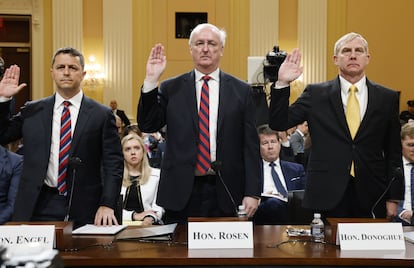Trump tried to put a loyalist at the helm of the Justice Department to challenge Biden’s victory
The committee investigating the January 6 attack on the Capitol reveals the ex-president tried changing the acting attorney general but ran into opposition from top officials who threatened to resign


The five public hearings held by the committee investigating the January 6 attack on Capitol Hill and broadcast on television have seen a parade of men and women who resisted the pressure and threats made by Donald Trump and his allies in the weeks between the November election and January 6, 2021. These hearings also pointed the finger at others who bowed to Trump’s illegitimate aspirations to stay in power.
On Thursday it emerged that members of the Justice Department attended an emergency meeting at the Oval Office on Sunday, January 3, three days before a mob encouraged by Trump attacked the Capitol, and prevented the president from firing the acting attorney general, Jeffrey Rosen. The reason Trump wanted to fire him? His refusal to publicly embrace the false theory that Joe Biden’s victory was not clean.
On the other side of history was Jeffrey Clark, a member of the Department specializing in environmental law and whose greatest virtue was, according to taped testimony from former New York Mayor Rudy Giuliani, that he didn’t care what might happen to his reputation by embarking on that crusade at the behest of the defeated president. Despite his complete lack of experience in procedural practice, Trump wanted to place Clark at the head of the Justice Department, only because he was willing to blindly support the theory of electoral fraud and to put the department at the service of the tycoon’s plan to revoke Biden’s victory.
The evidence that the committee is bringing before the public opinion shows that Trump was willing to use the American judicial arm for his own benefit, in a flagrant violation of the separation of powers that is at the base of any democracy. “He hoped law enforcement officials would give the appearance of legitimacy to his lies,” said committee chairman Bennie Thompson, a Mississippi Democrat, during his opening speech.

Rosen, who appeared as a witness on Thursday, had been appointed to replace Attorney General William Barr, one of the key pieces in the puzzle that the committee is putting together. Barr was the one who told Trump, in a phrase that has already gone down in history, that the fraud theory was “nonsense.” In a video shown during the fifth hearing, he was also seen to assure that without his resistance and his speed in dismantling the electoral conspiracies, a transfer of power probably would not have taken place. The president wanted Rosen to sign a letter to be sent to Georgia state election officials in which the Justice Department supported the fraud theory. When he refused to do so, Clark himself told his boss that Trump had asked him to replace him in his duties.
Rosen said that he was not going to allow himself to be fired by a subordinate. So he demanded a meeting with the president. It was held that same afternoon at the White House and several prominent members of the Justice Department came to defend the acting attorney general.
The other two witnesses summoned at the Thursday hearing were also present at that meeting in the Oval Office: acting deputy attorney general Richard Donoghue, a veteran member of the department and the US Army, and Steven Engel, another senior department official. After a tense exchange with the president and armed with the knowledge that five top officials were willing to resign immediately if things went ahead, they managed to get Trump to change his mind and drop his plans to replace Rosen with Clark.
The chairman of the committee has announced that the two remaining hearings will focus on how Trump made his followers believe his big lie, how he summoned them to Washington on January 6 and, when he was left with no other options to achieve his objectives,“ he resorted to violence.” Despite the initial plans, the hearings will not resume next week, but will do so in mid-July. “We are still investigating,” Thompson warned.
Tu suscripción se está usando en otro dispositivo
¿Quieres añadir otro usuario a tu suscripción?
Si continúas leyendo en este dispositivo, no se podrá leer en el otro.
FlechaTu suscripción se está usando en otro dispositivo y solo puedes acceder a EL PAÍS desde un dispositivo a la vez.
Si quieres compartir tu cuenta, cambia tu suscripción a la modalidad Premium, así podrás añadir otro usuario. Cada uno accederá con su propia cuenta de email, lo que os permitirá personalizar vuestra experiencia en EL PAÍS.
¿Tienes una suscripción de empresa? Accede aquí para contratar más cuentas.
En el caso de no saber quién está usando tu cuenta, te recomendamos cambiar tu contraseña aquí.
Si decides continuar compartiendo tu cuenta, este mensaje se mostrará en tu dispositivo y en el de la otra persona que está usando tu cuenta de forma indefinida, afectando a tu experiencia de lectura. Puedes consultar aquí los términos y condiciones de la suscripción digital.








































